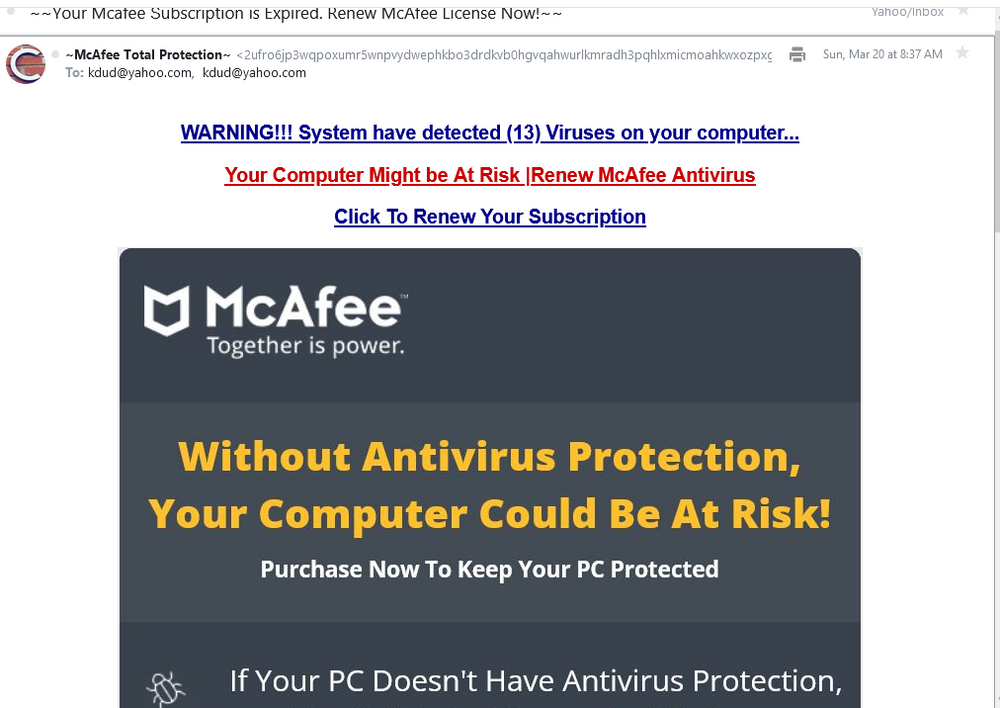Unveiling The Truth Behind McAfee Email Scam 2023: Stay Protected And Informed
Hey there, tech-savvy friend! Imagine this—you're just chilling, scrolling through your emails, and suddenly BAM! You get an email that seems legit, maybe claiming you need to update your McAfee subscription or face dire consequences. But hold up! Before you hit that "Reply" button or click any suspicious links, let's dive deep into the world of McAfee email scams in 2023. This is a big deal, folks, and we're here to help you navigate the chaos. So buckle up because we're about to break it all down for ya.
You’ve probably heard of McAfee, right? It’s one of the biggest names in cybersecurity, protecting millions of users worldwide. But with great power comes great responsibility, and unfortunately, some sneaky scammers are trying to exploit that trust. In 2023, McAfee email scams have been on the rise, and if you're not careful, they could trick you into giving away sensitive info or even your hard-earned cash. We're here to make sure that doesn't happen to you.
Now, why should you care? Well, these scams aren’t just harmless pranks—they’re serious threats that can compromise your personal data, bank accounts, and overall online safety. But don’t sweat it! By the end of this article, you'll be equipped with all the knowledge and tools you need to spot these scams a mile away and keep yourself protected. Let's get into it!
Read also:Unlocking The Secrets Of Myfastbrokercom Your Ultimate Guide To Broker Success
Table of Contents
- What Is McAfee Email Scam?
- Common Types of McAfee Email Scams
- How Do Scammers Operate?
- Red Flags to Watch Out For
- Prevention Tips to Stay Safe
- Real-Life Examples of McAfee Scams
- What to Do If You’ve Been Scammed
- McAfee Support and Resources
- Latest Trends in McAfee Email Scams
- Conclusion: Be Smart, Stay Safe
What Is McAfee Email Scam?
Alright, let's start with the basics. A McAfee email scam is essentially a fraudulent attempt by cybercriminals to impersonate McAfee or its services. These scammers send emails that look incredibly convincing, often warning users about fake security issues or urging them to update their subscriptions. The goal? To trick you into clicking malicious links, downloading harmful software, or handing over personal information like passwords, credit card numbers, or social security details.
But here's the kicker—these emails can be super tricky to spot if you're not paying attention. Scammers are getting smarter and more sophisticated, using tactics like spoofed email addresses, fake logos, and urgent language to manipulate their victims. So yeah, it's not just about being cautious; it's about being informed.
Common Types of McAfee Email Scams
Subscription Renewal Scams
One of the most common types of McAfee email scams involves fake subscription renewal notices. You might receive an email claiming your subscription is about to expire or has already expired, and you need to pay immediately to avoid losing protection. Sounds legit, right? Wrong! McAfee will never send unsolicited emails demanding payment.
Security Alert Scams
Another popular scam involves fake security alerts. These emails claim there's been suspicious activity on your account or that your device is at risk of malware. They'll urge you to click a link to "fix" the issue, but in reality, those links lead to phishing websites designed to steal your info.
Technical Support Scams
Here's another nasty one—technical support scams. Scammers pose as McAfee technicians, offering to help resolve non-existent issues with your software. They might ask for remote access to your computer or request payment for unnecessary services. Trust us, if McAfee really needed to contact you, they'd do it through official channels.
How Do Scammers Operate?
Scammers are like digital chameleons—they adapt their tactics to stay ahead of the game. Here's how they typically operate:
Read also:Andie Elle Nudes Separating Facts From Fiction And Understanding The Bigger Picture
- Spoofed Email Addresses: They use email addresses that look similar to McAfee's official ones, often with slight variations like extra letters or numbers.
- Phishing Links: These are malicious URLs embedded in emails that direct you to fake websites designed to steal your data.
- Social Engineering: Scammers rely heavily on psychological manipulation, using fear and urgency to push you into making hasty decisions.
- Malware Distribution: Some emails come with attachments containing viruses or spyware, which can wreak havoc on your system if opened.
Red Flags to Watch Out For
Now that you know how scammers work, let's talk about the warning signs. Here are some red flags to keep an eye out for:
- Unsolicited emails claiming urgent action is required.
- Emails with poor grammar, spelling mistakes, or unprofessional formatting.
- Requests for personal or financial information via email.
- Links or attachments that seem suspicious or unfamiliar.
- Offers that sound too good to be true, like free upgrades or discounts.
Prevention Tips to Stay Safe
Prevention is always better than cure, so here are some practical tips to protect yourself from McAfee email scams:
- Verify Sender’s Email Address: Always double-check the email address to ensure it matches McAfee's official domain.
- Hover Before You Click: Hover over any links in the email to see where they actually lead before clicking.
- Use Anti-Phishing Tools: Enable anti-phishing features in your email client or browser for added protection.
- Stay Updated: Keep your McAfee software and operating system up to date to patch any vulnerabilities.
- Be Skeptical: If something feels off, trust your instincts and don't engage with the email.
Real-Life Examples of McAfee Scams
Case Study 1: The "Expired Subscription" Scam
In early 2023, a user reported receiving an email claiming their McAfee subscription had expired. The email included a link to "renew" their subscription, but when clicked, it directed them to a phishing site that stole their credit card details.
Case Study 2: The "Security Breach" Scare
Another incident involved a user who received an email stating their account had been compromised. The email included a link to "secure" their account, but instead, it installed keylogging software on their computer.
What to Do If You’ve Been Scammed
Oh no, you think you might have fallen victim to a McAfee email scam? Don't panic! Here's what you should do:
- Disconnect from the Internet: If the scammer accessed your computer remotely, disconnect immediately to prevent further damage.
- Run a Full System Scan: Use trusted antivirus software to scan your system for malware or viruses.
- Change Your Passwords: Update all your passwords, especially for accounts linked to the compromised data.
- Report the Scam: Contact McAfee support and report the incident to local authorities or relevant cybersecurity agencies.
McAfee Support and Resources
McAfee offers a range of resources to help users stay safe from scams:
- Official Website: Visit mcafee.com for the latest news and updates on scams.
- Customer Support: Reach out to McAfee's support team for assistance with any concerns.
- Security Blog: Stay informed with McAfee's blog, featuring expert insights and tips on cybersecurity.
Latest Trends in McAfee Email Scams
In 2023, scammers are leveraging emerging technologies like AI and machine learning to enhance their tactics. They're also targeting specific demographics, such as elderly users or small businesses, who may be less tech-savvy. Staying informed about these trends is crucial to staying ahead of the game.
Conclusion: Be Smart, Stay Safe
Alright, we've covered a lot of ground here, and hopefully, you're feeling more confident about tackling McAfee email scams. Remember, knowledge is power, and by staying vigilant and informed, you can protect yourself from these digital predators.
So, what's next? Share this article with your friends and family to spread awareness. Bookmark McAfee's official resources for future reference. And most importantly, never hesitate to question the legitimacy of an email—your safety depends on it!
Got any questions or stories to share? Drop a comment below, and let's keep the conversation going. Together, we can make the internet a safer place for everyone!



